Quick Navigation:
- Why delete or erase data?
- Data formatting and deleting vs. erasure
- The reliable data erasure program - DoYourData Super Eraser
- Three flexible data erasure modes
- Conclusion:
Data deletion and erasure may sound the same, however, these are 2 terms to not be confused. Information deletion leaves data recoverable, whereas data erasure is permanent; this is often particularly necessary for businesses, as obtaining these two terms confused can gift important issues.
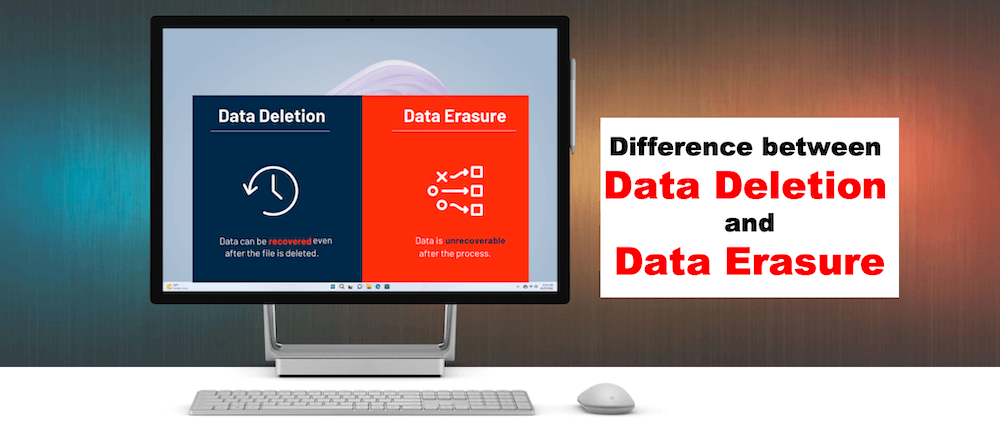
There's a great deal of confusion around the definition of knowledge erasure. Most of the difficulty comes from the thinking that the likes of reformatting and 'the delete button' are secure strategies of erasure – they aren't!
Still, the overwhelming majority of users in organizations believe these methods are suitable, which might leave their sensitive data vulnerable to a possible data breach.
Why delete or erase data?
A lot of data than ever before
Organizations are creating, storing, and sending more data than ever before. In 2018, the world volume of knowledge} was thirty-three zettabytes (ZB). By 2025, the IDC predicts, that range can balloon to one hundred seventy-five zettabytes of data worldwide. Whereas company data holds great value, it additionally carries a good deal of risk. The more data your organization deals with, the larger the danger of its exposure.
What forms of data are there?
Client data - This includes in-person peaceable information (PII). Client data will enable you to identify a particular person similar to name, address, account numbers, monetary information, and Social Security numbers. It also covers protected health data (PHI), such as medical records or associated payment data.
Worker data – this is often similar to client data, however will embody regular payment and performance reviews. company data – this might include intellectual property, analysis and development data, selling information, merger and acquisition information, financial results, internal communications, operational information.
Information available
The hazards of confusing erasure and deletion were evident in one of our recent studies. In partnership with Blancco Technologies, we have a tendency to purchased 159 second-hand drives (a mixture of HDDs and SSDs) from eBay and Amazon to analyze for residual information.
We have a tendency to find sensitive residual data on 42% of the devices, with 15% containing PII. This meant that for every twenty drives analyzed, a minimum of 3 had PII residing on them.
A number of the PII included:
- A drive from a software package developer with a high level of state security clearance. Scanned pictures of family passports and birth certificates, CVs, and monetary records
- College man papers and associated email addresses
- 5GB of archived internal workplace email from a serious travel company
- 3GB of information from a cargo/freight company, in conjunction with documents particularization shipping details, schedules, and truck registrations
- College man papers and associated email addresses
- Company information from a music store, together with 32,000 photos
- Faculty data, including photos and documents with pupils' names and grades
One of the many considerations to focus on from the study is that every one of the second-hand sellers that the drives were purchased from declared that correct data cleaning strategies had been performed – guaranteeing that no data would be left behind. The results show that this wasn't the case; lightness is a big concern that whereas people recognize the importance of removing information, the strategies that they're using are inadequate.
Data formatting and deleting vs. erasure
Data formatting
It's been a typical misunderstanding that formatting a drive could be a secure method of erasing data. It's actually a lot of reliable than simply deleting the files, however, a format will solely create the software package mark the area as deleted therefore a write will occur. You'll not see any data on your screen, but they're going to still be there and out there to recover.
Recycle bin
One deletion technique that's usually mistaken for the way of erasing information is the use of the recycle bin on a laptop computer or desktop. Any file that you simply send to a recycle bin – even when empty the recycle bin – isn't erased, it continues to exist on your onerous drive. The files hide from view, however, most data recovery programmers can quickly recover these files.
Data Erasure
Data erasure means to use special data erasure algorithms to delete and overwrite the data so that the data will be lost forever, can't be recovered by data recovery software.
The reliable data erasure program - DoYourData Super Eraser
Most of common users don't know how to perform data erasure on their computers or storage devices. Don't worry, data erasure program can easily do data erasure and make sure the files are lost forever, can't be recovered by any data recovery software.
DoYourData Super Eraser is one of the most powerful data erasure programs. It offers military & government security data erasure standards including HMG Infosec Standard 5 (1 pass), Peter Gutmann's algorithm 2 (2 passes), U.S. Army AR380-19 (3 passes), DoD 5220.22-M ECE (7 passes), Peter Gutmann's algorithm 35 (35 passes). Once the data is erased by DoYourData Super Eraser, the data will be lost forever, can't be recovered by any data recovery method.
DoYourData Super Eraser
- Securely and permanently shred files, wipe hard drive, erase free disk space, etc.
- 5 certified data erasure standards.
- Three flexible data erasure modes.
- 100% erase the selected data.
DoYourData Super Eraser is a 100% safe data erasure program. It will not cause any damage to your disk, SSD included. Once your data is erased by this software, the data is lost forever, can't be recovered by any data recovery software. Before you sell, donate or reuse your PC/Mac, you can use this software to permanently wipe all sensitive data.
Three flexible data erasure modes
The software DoYourData Super Eraser offers 3 different data erasure modes. You can use the software to erase data in different situations. The software is also very simple to operate, you can easily handle the software to shred files or wipe drive. Here we will introduce the 3 data erasure modes of the software one by one.
Mode 1. Erase Files/Folders
Permanently erase selected files and folders from any disk drive or storage device. With this mode, you can only erase specified files or folders without affecting other files. It's proper for the users who only need to remove some sensitive files permanently.
Select the individual files or folders which you want to erase permanently, then select a data erasure standard and start to shred the files/folders permanently.
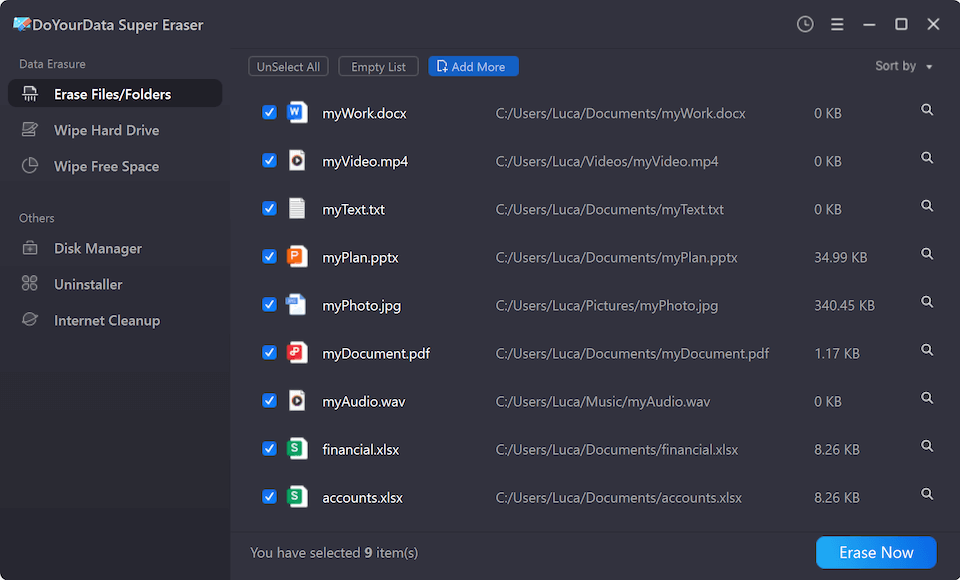
Mode 2. Wipe Hard Drive
Wipe all data (existing data, deleted/lost data included) on the hard drive. By using this mode, you can easily wipe an entire disk to ensure all data on the drive is gone forever. When you need to sell or donate an old drive or device, this mode is proper for you to wipe all data.
Ensure to select the right disk you want to wipe and choose a data erasure algorithm. The software will erase all data, including existing and deleted/lost data, on the drive.
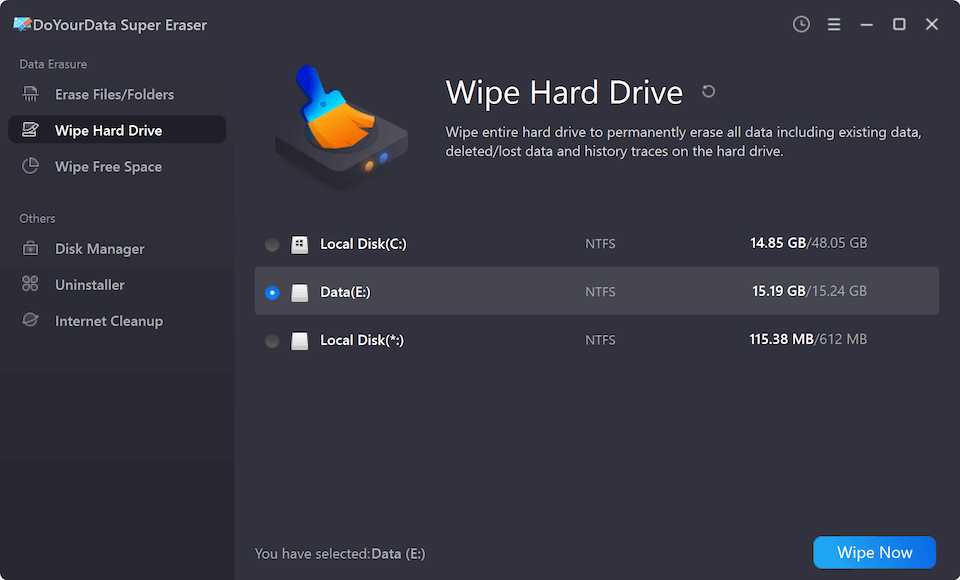
Mode 3. Wipe Free Space
Wipe free disk space of the hard drive to permanently erase all already deleted/lost data on the hard drive. It will not affect the existing data. If you have deleted or removed some files and then want to ensure these files will not be recovered by others, you can use this mode.
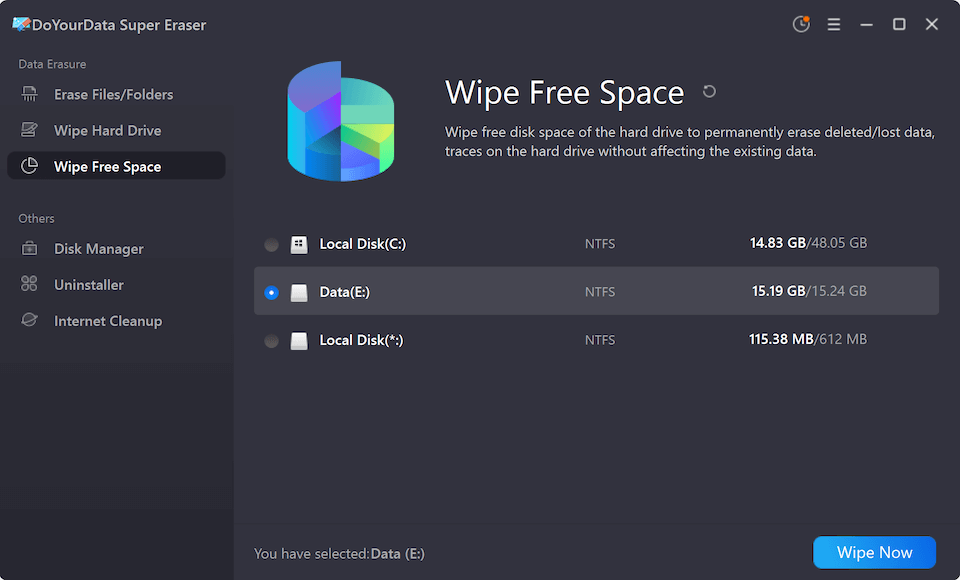
📍 Tips: The data wiped by the software will no longer be recoverable in any way. So, it's important to check and back up the needed files first. Also be careful to choose the right drive, files or folder to erase and avoid data loss.
Conclusion:
Understand the different between the data deletion and data erasure will help protect privacy information. If you simply deleted files or even emptied the recycle bin or trash, it will release the space of the drive. However, the data is not gone for good. With professional data recovery software, it's easy and fast to recover the deleted files.
Should you need to erase sensitive or confidential data, professional data erasure tool is needed. The tool is able to overwrite and destroy the data permanently to avoid data recovery. DoYourData Super Eraser is such a wonderful tool that can wipe data permanently and protect your privacy information.
It's important to back up needed data before erasing data. Also, think twice and ensure to select the right data to erase as the erased data is not recoverable any more.
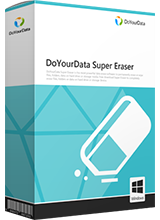
DoYourData Super Eraser
DoYourData Super Eraser, the award-winning data erasure software, offers certified data erasure standards including U.S. Army AR380-19, DoD 5220.22-M ECE to help you securely and permanently erase data from PC, Mac, HDD, SSD, USB drive, memory card or other device, make data be lost forever, unrecoverable!